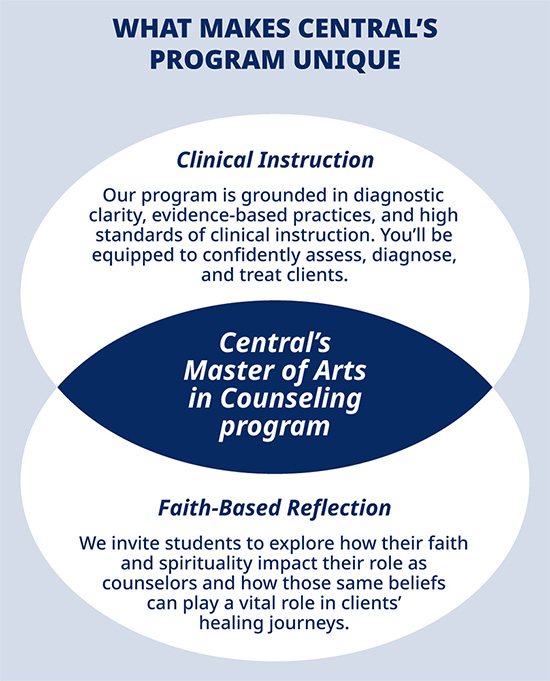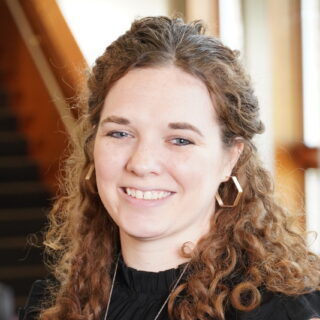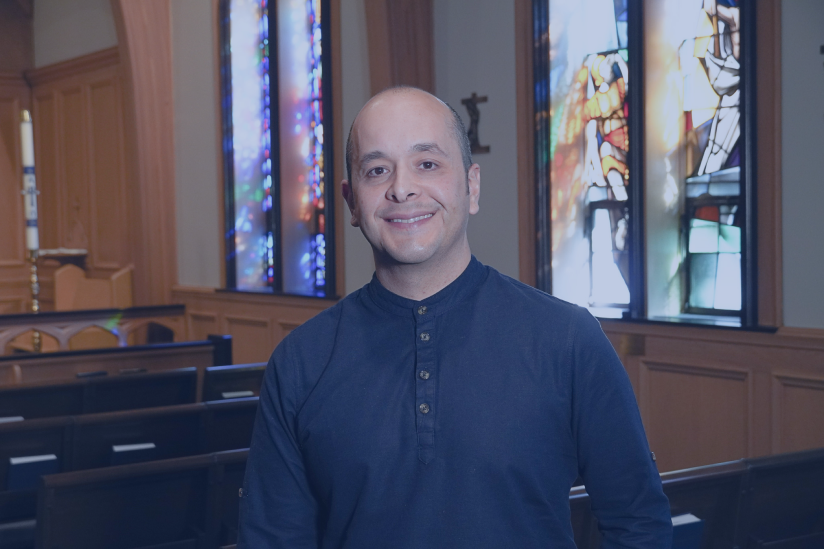Earn a Master of Arts in Counseling at Central Seminary
English | In-Person/Online | 60 Credits
Our accredited online Master of Arts in Counseling program equips students to sit for licensure exams to serve as professional counselors, in both faith-based and secular settings.
PROGRAM HIGHLIGHTS:
- Flexible completion. Finish in just three years while maintaining full-time employment.
- Comprehensive curriculum. 60 credit hours includes a three-term internship for hands-on experience.
- Dual credential opportunity. Add four courses to earn a Graduate Certificate in Chaplaincy.
- Convenient start dates. Begin your journey in January, May, or August.
- Affordable options. Competitive tuition rates, scholarships, and payment plans are available.
- Excellent preparation. Currently a 100% pass rate for students who have attempted their state licensure exam to date.
Graduates are prepared to work in faith communities, non-profits, mental health clinics, or private practice. Ready to make an impact? Contact us today to learn more and take the first step toward your counseling career.
Why Pursue a Master’s Degree in Counseling?
The Masters of Arts in Counseling (MACO) degree equips students to serve within mental health providers, non-profit organizations, faith communities and secular private practice as licensed professional counselors. Upon graduation from the program, students will have a holistic understanding of mental and spiritual health and will be trained in the necessary skill set to be a knowledgeable, compassionate mental health provider to diverse populations.
Prospective students are encouraged to check out these articles written by Dr. Lindsay Bonebrake, director of the counseling program at Central. They are designed to help you discern if Central is the right place for you to complete your counselor education, and if counseling is the right field for you:
- The Future of Counseling: Why Now is the Time to Pursue a Career in Mental Health
- Answering the Call: Why a Master’s Degree in Counseling at Central Seminary is the Perfect Fit for You
- Supporting Mental Health in a Changing World: The Role of Counseling Education
- Bridging the Gap: The Importance of Mental Health Support in the Church
- The Integration of Faith and Counseling: Equipping Counselors for Holistic Care
Interested in taking your first class for free?
Join us for a three-part webinar series with counseling program faculty and alumni to help you discern your calling in counseling and prepare for graduate school. Those that complete all three sessions and are admitted to the Master of Arts in Counseling Program at Central Seminary can take their first class tuition free! Upcoming sessions will be scheduled soon!

The Master of Arts in Counseling program at Central isn’t just about passing the licensure exam—it’s about becoming a compassionate, reflective, and effective counselor. We understand that human beings are complex, and we train students to approach each client with empathy, integrity, and an integrated perspective.
Central’s Master of Arts in Counseling program stands out because it blends clinical excellence with faith-based reflection, preparing students to become licensed counselors who care for the whole person—mind, body, and soul.
Master of Arts in Counseling Program
Through the coursework and the experiential learning required by this program, students are prepared for a career in counseling across a variety of settings. The MA in Counseling is designed to prepare students for the state licensing exams in Kansas, as well as other state requirements.
Applications Calendar
| Session | Start Date | Application Deadline |
|---|---|---|
| Summer 2026 (May - August) | May 18, 2026 | April 27, 2026 |
| Fall 2026 (August - November or December) | August 17, 2026 | July 27, 2026 |
Tuition & Fees
Tuition
$410 per credit (25-26 academic year) before scholarships or other financial support.
Registration Fee
$250 per term
Graduation Fee
$200
Admissions Information
Start your application anytime. Classes start in August, January, and May. Official transcripts, a 2.3 undergraduate GPA, a Counselor Disposition Survey, three character references (excluding family), and an autobiographical statement will be required for admission. Applicants should have a bachelor’s degree from an accredited educational institution. Students participating in the English program for whom English is not their first language will be required to demonstrate their English proficiency.
Required Coursework
60 Credit Hours
- Professional Orientation and Ethics (3 cr)
- Counseling Theories (3 cr)
- Life Span Development (3 cr)
- The Helping Relationship (3 cr)
- Abnormal Psychology (3 cr)
- Multicultural Counseling (3 cr)
- Psychological Tests and Measurements (3 cr)
- Theory and Methods for Group Counseling (3 cr)
- Career Development (3 cr)
- Statistics and Research Methods (3 cr)
- Marriage & Family Counseling (3 cr)
- Diagnosis & Treatment of Childhood & Adolescent Disorders (3 cr)
- Diagnosis & Treatment of PTSD and Other Related Trauma Disorders (3 cr)
- Diagnosis & Treatment of Substance Use Disorders (3 cr)
- Differential Diagnosis and Treatment Planning (3 cr)
- Supervised Counseling Practicum (3 cr)
- Biological Basis of Behavior (3 cr)
- Psychopharmacology (3 cr)
- Supervised Counseling Internship 1 (2 cr)
- Supervised Counseling Internship 2 (2 cr)
- Supervised Counseling Internship 3 (2 cr)
Add the following 12 credit hours to earn the Graduate Certificate in Chaplaincy in addition to your MACO degree:
- Introduction to Chaplaincy (3 cr)
- Chaplaincy in Hospice and Elder Care (3 cr)
- Caring Ministries (3 cr)
- Christian Ethics (3 cr)
Course delivery types, days/times, and locations are available on published Course Schedules here.
Contact Admissions

Lindsay Bonebrake
Director of the Master of Arts in Counseling & Associate Professor of Counseling
Professional Competencies
Through engagement with appropriate readings, faculty instruction, peer collaboration, and supervised practicum and internship experiences, graduates will develop professionalism in the following areas:
- Scholarship: Students will demonstrate the knowledge and skills needed to critically evaluate and communicate requisite knowledge about professional counseling.
- Professional Attitude and Behavior: Students will demonstrate knowledge and skills needed to conduct themselves professionally as defined by the American Counseling Association (ACA) ethical standards for professional counselors.
- Cultural Competence: Students will demonstrate the knowledge and skills needed to appropriately factor a client’s unique cultural characteristics into decision making related to diagnoses, treatment models, counseling methods and techniques, and expected outcomes.
- Professional Practice: Students will demonstrate the knowledge and skills needed to provide “standard of care” to clients from an integrated mind, body, soul, and spirit model of therapy and model of treatment.
Benefits of the MACO Program
A Master’s degree in counseling will provide you with a strong foundational knowledge of the field while equipping you with a thorough understanding of a range of theoretical frameworks and modalities that will inform your counseling practice. The critical thinking and active listening skills that you gain during this program will prepare you to thoughtfully engage with the counseling profession. Students go on to exciting and meaningful careers such as social work, education, and healthcare.
Students will develop clinical skills by participating in a structured internship placement where they interact with clients, peers, skilled mentors, and faculty which will allow them to develop their skills as a counselor.
The goal of this internship is to allow students to apply their coursework in professional settings with real patients. This experiential component of the Master of Arts in Counseling program is what helps students confidently progress from student to licensed counselor.
Students who complete the MACO program at Central have the advantage of completing a counseling degree in a faith-based setting, meaning that conversations with a spiritual or faith based dimension are welcomed.
For students that speak Korean and would prefer a faith-based program, you can pursue a Christian Care and Counseling degree. The program provides a strong focus on faith-based organizational ministry, but does not meet requirements for licensure in the United States.

Reasons to Come to Central Seminary for Your Counseling Degree
Official transcripts, a 2.3 undergraduate GPA, Counselor Disposition Survey, three character references (excluding family), and an autobiographical statement will be required for admission. Applicants should have a bachelor’s degree from an accredited educational institution. Students participating in the English program for whom English is not their first language will be required to demonstrate their English proficiency.
- Tuition: $415 per credit (25-26 tuition rates)
- Registration: $250 per semester
- Graduation Fee: $200
You will develop clinical skills by participating in a structured internship placement where you will interact with clients, peers, skilled mentors, and faculty, all of which are critical for developing your skills as a counselor.
The goal of each component of the internship is to allow students to apply their coursework in professional settings with real patients. This experiential aspect of the MACO program is what will help you confidently progress from student to licensed professional counselor.
The Master of Arts in Counseling program is designed to allow you to sit for national and state licensure exams in the state of Kansas and other states. From there, students will have the qualifications to apply to many jobs within the field or to further their education. Additionally, the required internship program will help you to build professional connections outside of the classroom.
For joining classes online students will need a working computer or laptop with access to high-speed internet. Applications like Zoom will be needed for attending class, Google Docs or Microsoft Office will be needed to complete assignments, and Microsoft Outlook will be required for communication with peers and faculty.
Upon completion of the program, there are a variety of ways you can apply your counseling education in professional settings. You can work directly for a church, offering counseling services to members of the congregation who may be struggling with bereavement, marriage issues, addiction, or abuse. You can also choose to become a licensed practitioner in your state and open a private counseling practice or work for an established practice or organization. Competent counselors are needed to help youth, adult, and senior age populations in most communities, in faith-based and secular organizations.
Central’s program is not a biblical counseling program. Central’s program is built on clinical excellence and is designed to prepare students to sit for licensure exams. But what makes Central’s program so unique, is that because it is offered at a seminary, our curriculum is not just clinically rich, it also incorporates the opportunity for faith-based reflection and the integration of your theology into your coursework.
Our curriculum utilizes the bio-psycho-social-spiritual model in order to teach our students to provide holistic care to their future clients, acknowledging the connection between social, psychological, physical, and spiritual aspects of client care.
We desire to prepare students to become competent counseling practitioners who practice with integrity and empathy. Coursework focuses on helping students learn to apply holistic treatment methods after making a diagnosis.
The 60-hour Master of Arts in Counseling (MACO) degree is designed to lead to professional licensure as outlined by the Behavioral Sciences Regulatory Board of Kansas; other state and international boards have unique licensure requirements. Therefore, before enrolling in a licensure program at Central Seminary, students should consult the rules and regulations regarding Professional Counseling for the particular state or nation in which they intend to seek licensure after graduation. Enrollment in the MACO program does not guarantee a degree from Central or promise qualification for professional licensure. Students are responsible for meeting all academic and professional requirements for graduation. For further information regarding these academic and professional requirements, see the Central Student Handbook as well as the following pages of the MACO handbook. Students enrolled in the MACO program are responsible for knowing the material outlined in this handbook.
Further, if a student intends to practice in a state other than Kansas after graduation, the student should inform the program. The program will make a reasonable effort to determine if the program satisfies the educational requirements of that state. The student will be informed of these findings. Students who will seek licensure or credentialing outside the United States are responsible for researching the prerequisites for licensure in another country.
Upon completion of the program, there are a variety of ways you can apply your counseling education in professional settings. You can work directly for a church, offering counseling services to members of the congregation who may be struggling with bereavement, marriage issues, addiction, or abuse. You can also choose to become a licensed practitioner in your state and open a private counseling practice or work for an established practice or organization. Competent counselors are needed to help youth, adult, and senior age populations in most communities, in faith-based and secular organizations.
No, graduates from the counseling program are not required to obtain state licensure.
The pros of state licensure include but are not limited to: being able to bill a client’s insurance, having a credential that is recognized by other health professionals, and having a standard for continuing education that will keep you up-to-date on best practices. Some of the cons of licensure include but are not limited to: the input and potential limitations third-party payers (such as insurance) can place on practitioners such as the number of visits, paying for license renewal each year, can limit the application of spiritual practices within therapy depending on the setting.
As a new program, we are not yet CACREP accredited. While CACREP accreditation is our goal for the future, our current students can be assured that our program was designed using CACREP standards and the course offerings are those required by other CACREP accredited programs. Our current status may result in a longer waiting period while academics on a student’s application for state licensure is reviewed by their state board.
Our program is new. While we only have a few graduates, 100% have passed their National Counseling Exam (NCE)!
Good counselors are good listeners. They are able to process information not only with their head but with their heart as well. Good counselors develop the wisdom needed to integrate their head and heart knowledge to analyze the information presented to them and give discerning help to their clients. Good counselors are committed to their own mental and emotional health and spiritual growth to focus on the care of the person they serve.
The good news is our field is only growing! As the acceptance of therapy grows in the broader culture, so does the need for good counselors.

Mission Statement
Central’s Master of Arts in Counseling Program is designed to prepare persons from a wide range of spiritual and social identities for vocations as clinically skilled licensed counselors who will value the integration of spirituality among the complex mental, physical, and emotional components that constitute human personhood and health. In addition to developing professional counseling skills, students will prepare to serve individuals and communities of varied or no religious traditions and affiliations. Students will explore and grow in awareness of their own religious assumptions and convictions and develop insight into what influences their work as counselors.
- To develop skill in acquiring patient intake information, accurately diagnosing, treatment planning, and note taking.
- To develop clinical skills, including sensibilities for human spirituality, that are needed to establish and maintain rapport with clients and facilitate the treatment process.To prepare professional counselors to provide mental health services in various clinical settings to a multicultural diverse society.
- To inculcate a professional counselor orientation and identity.
- To develop a comprehensive understanding of counseling theories and select evidence-based treatments appropriate for diagnoses.
- To develop evidence-based treatments that emphasize wellness and prevention.
- To value research and continuing professional development.
- To equip the student to sit for the NCE exam.
The purpose of Central’s MA in Counseling degree is to equip students to become Licensed Professional Counselors. Students graduating from Central’s Master of Arts in Counseling degree will:
- Demonstrate the ability to provide mental health services to a multicultural diverse society in various clinical and ministry settings.
- Demonstrate and articulate the meaning of professional counselor orientation and identity.
- Demonstrate a comprehensive understanding of counseling theories and the ability to select evidence-based treatments informed by diagnoses.
- Demonstrate skill in acquiring patient intake information, accurately diagnosing, treatment planning, and note taking.
- Demonstrate the counselor skills and sensibilities for human spirituality needed to establish and maintain rapport and facilitate the treatment process.
- Demonstrate the ability to develop evidence-based treatments that emphasize wellness and prevention.
- Demonstrate through study, course and clinical work, personal initiatives, and exercise of vocation that you, as a professional counselor, value research and continuing professional development.
- To prepare the student to sit for the NCE exam.
Counseling Program Faculty
Director of the Master of Arts in Counseling & Associate Professor of Counseling
Lindsay Bonebrake
Director of the Master of Arts in Counseling & Associate Professor of Counseling
Specialist Assistant Professor in Counseling
Kenneth Tombley
Specialist Assistant Professor in Counseling